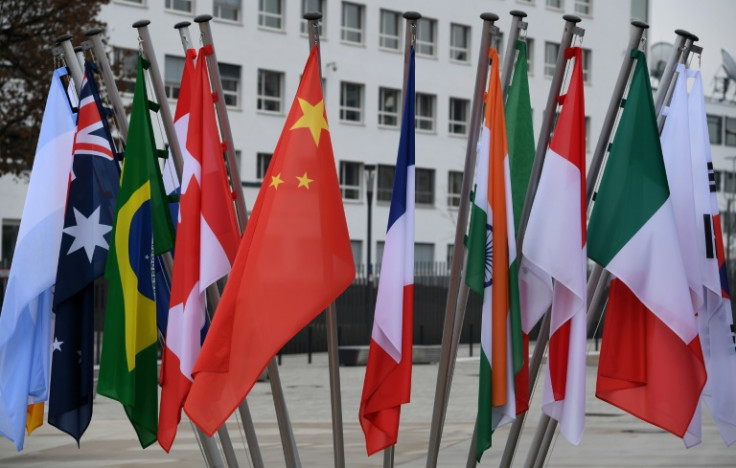G20 Meets Amid Ukraine War, US-Saudi Tensions

The G20 held talks in Washington on Thursday, but Russia's presence in the club made any consensus unlikely despite the multiple crises facing the world.
Finance ministers and central bankers from the Group of 20 major economies are gathered in the US capital during annual meetings of the IMF and World Bank that have focused on Russia's war in Ukraine, soaring inflation and a climate crisis.
But the G20 is unlikely to agree on many issues, with the group now facing tensions between Saudi Arabia and the United States over OPEC+ oil production cuts that Washington fears will further fuel inflation.
Despite the divisions, Western officials said the G20 remains a useful forum.
"Even if there are different opinions -- including those that you don't share, some even that you don't understand -- it's still a good forum for a conversation," said German Finance Minister Christian Lindner.
"It is better to have a forum to speak in than none," he told reporters.
But the G20 is expected to close its meeting without a joint communique, as in its previous gatherings presided by Indonesia this year. A press conference is scheduled for later Thursday.
"We could do a communique that doesn't mention the war in Ukraine, but we don't want a communique that sweeps things under the rug," a source close to the discussions told AFP.
While Western nations have imposed unprecedented sanctions on Russia, other countries have maintained economic ties with Moscow, with India and China stepping up their purchases of Russian oil.
The Group of Seven wealthy democracies is now looking to cap the prices of Russian crude exports, a move aimed at stripping the country of a major source of funding for its war effort.
The G7 -- which includes Britain, Canada, France, Germany, Italy, Japan and the United States -- said Wednesday it had made "significant progress" in key parts of its proposal, noting that it had added Australia to its coalition.
Gaining broad global approval for a price cap is a key challenge for the proposal.
The Saudi-led OPEC group of oil exporters has angered the United States by agreeing on a drastic production cut with Russia and other allies, which could send energy prices soaring even higher.
Washington has accused OPEC+ of aligning itself with Moscow, and on Wednesday President Joe Biden threatened "consequences" for Saudi Arabia.
In a statement, the Saudi foreign ministry denied that the decision was "politically motivated against the United States" and expressed its "total rejection of these statements that are not based on facts."
But US National Security Council spokesman John Kirby responded that Ryiadh knew the cut "would increase Russian revenues and blunt the effectiveness of sanctions. That is the wrong direction."
The source close to the G20 discussions said Western nations explained at the meeting that they were "disappointed" and that it went against Saudi interests "because the risk for them is that they cause a recession."
"It's hard to understand," the source said.
The G20 also discussed the state of the global economy and debt at a dinner on Wednesday. On Thursday they talked about the financial sector, regulating cryptocurrencies, a global minimum tax on corporations and how to follow through on pledges in climate financing, the source said.
Tensions within the G20 come as leaders are due to meet at a summit in Bali, Indonesia, next month that could see Biden share the same venue as Russian President Vladimir Putin and another rival, Chinese leader Xi Jinping.
The lack of consensus within the group also comes ahead of the United Nations' COP27 climate summit in Egypt in November.
IMF Managing Director Kristalina Georgieva said Wednesday that the world has to invest up to $6 trillion per year if it is to meet the Paris agreement goal of reaching net-zero carbon emissions by 2050.
"If we do not shift our trajectory this decade, we're cooked. If we don't want to be cooked, then we should speed up," Georgieva said Wednesday in talks on climate change.
© Copyright AFP 2024. All rights reserved.











